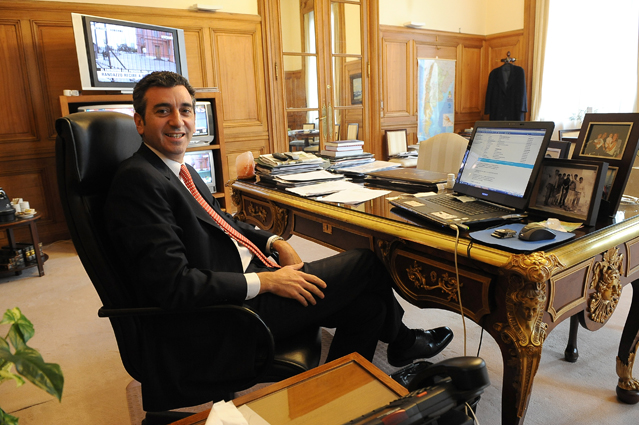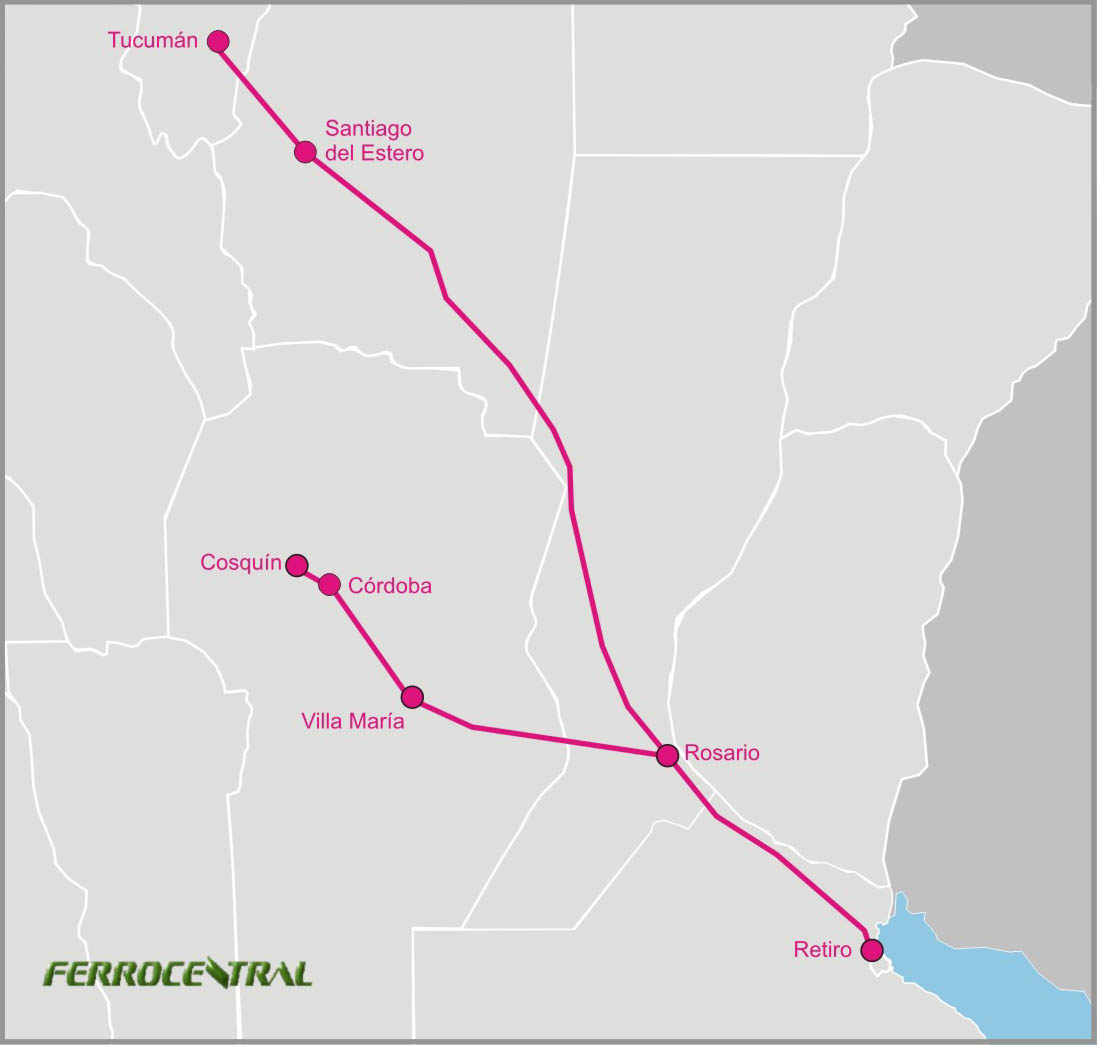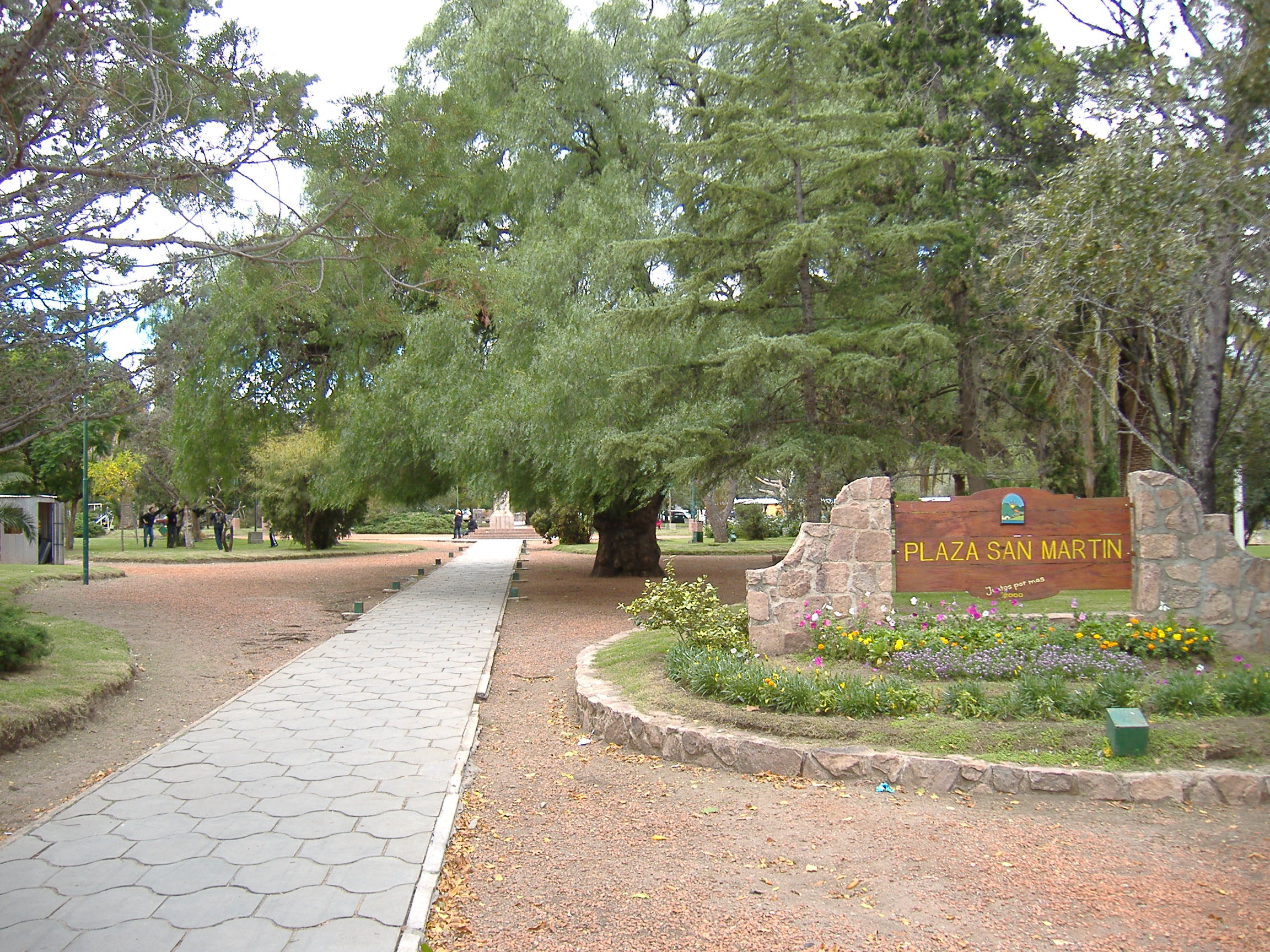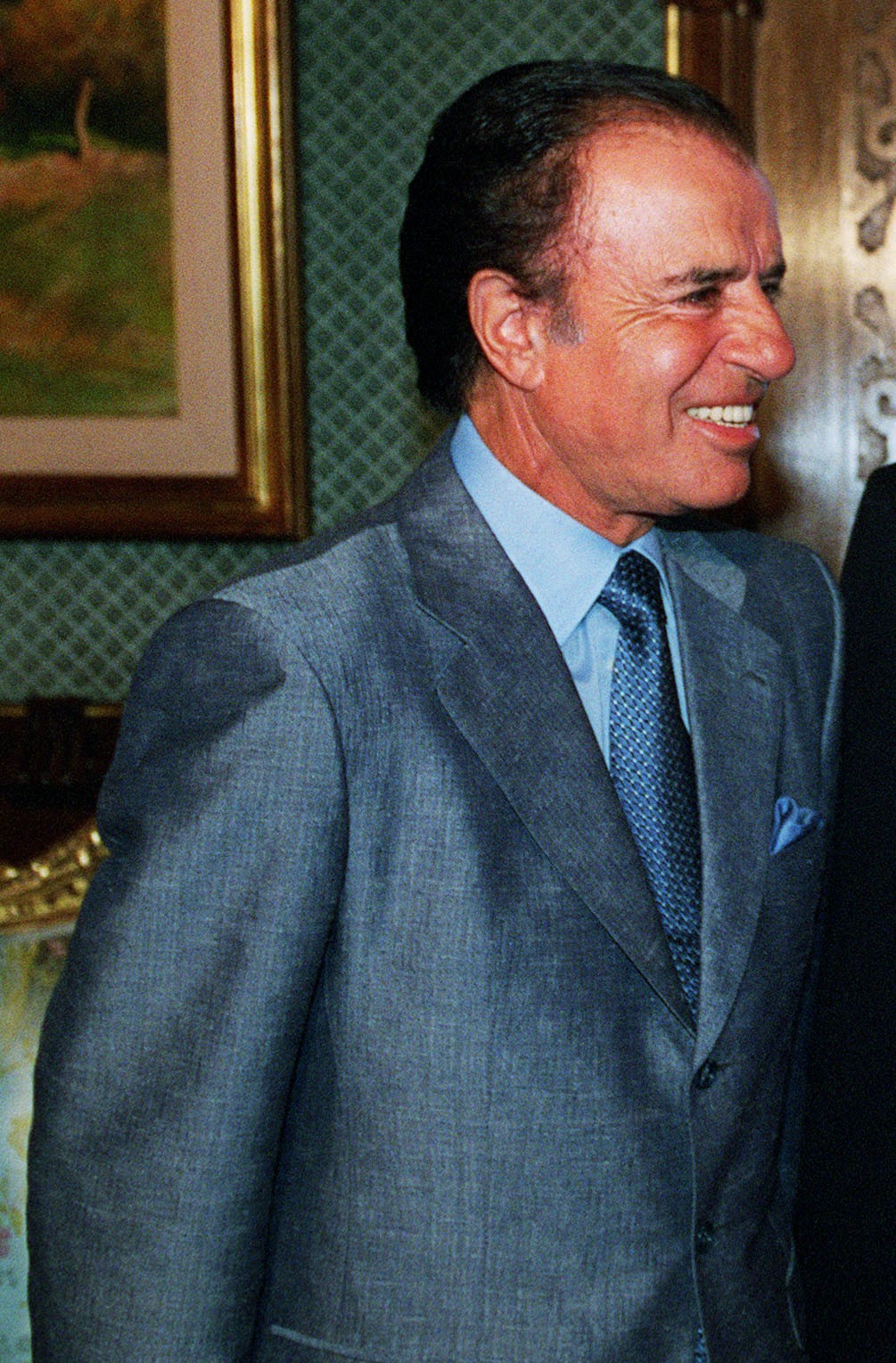|
Alta Córdoba Railway Station
Alta Córdoba is a railway station located in the Alta Córdoba neighborhood of Córdoba in the province of the same name, Argentina. The station is terminus of the Tren de las Sierras service operated by state-owned Trenes Argentinos. Likewise, another state company, Trenes Argentinos Cargas y Logística, operates freight services there. History The station was originally built by the Córdoba Central Railway that operated a line between provinces of Córdoba and Santa Fe, opening the first section in 1888. In 1938, the Córdoba Central Railway (with some financial problems) was taken over by the Argentine state, being added to the Central Northern Railway network. When the Juan Perón's administration nationalised the whole railway network in 1948, the Central Northern Railway (and therefore the Alta Córdoba station) became part of General Belgrano Railway, one of the six divisions of recently formed Ferrocarriles Argentinos. By the 1960s the line had its golden age ... [...More Info...] [...Related Items...] OR: [Wikipedia] [Google] [Baidu] |
Commuter Rail
Commuter rail, or suburban rail, is a passenger rail transport service that primarily operates within a metropolitan area, connecting commuters to a central city from adjacent suburbs or commuter towns. Generally commuter rail systems are considered heavy rail, using electrified or diesel trains. Distance charges or zone pricing may be used. The term can refer to systems with a wide variety of different features and service frequencies, but is often used in contrast to rapid transit or light rail. Similar non-English terms include ''Treno suburbano'' in Italian, ''Cercanías'' in Spanish, Aldiriak in Basque, Rodalia in Catalan/Valencian, Proximidades in Galician, ''Proastiakos'' in Greek, ''Train de banlieue'' in French, '' Banliyö treni '' in Turkish, ''Příměstský vlak'' or ''Esko'' in Czech, ''Elektrichka'' in Russian, ''Pociąg podmiejski '' in Polish and ''Pendeltåg'' in Swedish. Some services share similarities with both commuter rail and high-frequency rapid ... [...More Info...] [...Related Items...] OR: [Wikipedia] [Google] [Baidu] |
Juan Perón
Juan Domingo Perón (, , ; 8 October 1895 – 1 July 1974) was an Argentine Army general and politician. After serving in several government positions, including Minister of Labour and Vice President of a military dictatorship, he was elected President of Argentina three times, serving from June 1946 to September 1955, when he was overthrown by the '' Revolución Libertadora'', and then from October 1973 until his death in July 1974. During his first presidential term (1946–1952), Perón was supported by his second wife, Eva Duarte ("Evita"): they were immensely popular among the Argentine working class. Perón's government invested heavily in public works, expanded social welfare, and forced employers to improve working conditions. Trade unions grew rapidly with his support and women's suffrage was granted with Eva's influence. On the other hand, dissidents were fired, exiled, arrested and tortured, and much of the press was closely controlled. Several high-profile war crimin ... [...More Info...] [...Related Items...] OR: [Wikipedia] [Google] [Baidu] |
Railway Stations In Argentina
Rail transport (also known as train transport) is a means of transport that transfers passengers and goods on wheeled vehicles running on rails, which are incorporated in tracks. In contrast to road transport, where the vehicles run on a prepared flat surface, rail vehicles (rolling stock) are directionally guided by the tracks on which they run. Tracks usually consist of steel rails, installed on sleepers (ties) set in ballast, on which the rolling stock, usually fitted with metal wheels, moves. Other variations are also possible, such as "slab track", in which the rails are fastened to a concrete foundation resting on a prepared subsurface. Rolling stock in a rail transport system generally encounters lower frictional resistance than rubber-tyred road vehicles, so passenger and freight cars (carriages and wagons) can be coupled into longer trains. The operation is carried out by a railway company, providing transport between train stations or freight customer facil ... [...More Info...] [...Related Items...] OR: [Wikipedia] [Google] [Baidu] |
Florencio Randazzo
Aníbal Florencio Randazzo (born 1 March 1964) in an Argentine Justicialist Party politician. He was Minister of the Interior and Transport during the presidency of Cristina Fernández de Kirchner, from 2007 to 2015. An ally of Kirchner's during most of his political career, Randazzo fell out with her and ran against her for a seat in the Senate in 2017. Since 2021, he has been a National Deputy elected in Buenos Aires Province as part of the '' Vamos con Vos'' alliance. Life and times Aníbal Florencio Randazzo was born in Chivilcoy, Buenos Aires Province, in 1964, to Gladys Campagnon and Juan "Togo" Randazzo, whose father emigrated from Sicily to Argentina. The elder Randazzo was an active Peronist organizer in Chivilcoy and first involved his son, Florencio, in political activity in 1981, during an economic crisis precipitated by Argentina's dictatorship at the time. Enrolling at the University of Buenos Aires in 1983, he graduated with a degree in accountancy in 1989. R ... [...More Info...] [...Related Items...] OR: [Wikipedia] [Google] [Baidu] |
Ferrocentral
Ferrocentral was an Argentine private railway company, with a name formed by a combination of the Spanish words for "Central Rail". It operated long-distance passenger trains from its base at Retiro station in Buenos Aires to several locations in northern Argentina, running on Ferrocarril Mitre's Indian gauge tracks. The company also ran regional services (such as Tren de las Sierras) on Ferrocarril Belgrano's tracks in Córdoba Province. The National Government invested $10 million to re-open the line. History All of the train routes managed by Ferrocentral had been previously operated by Ferrocarriles Argentinos, the country's now-defunct national passenger railroad corporation. After the privatisation of Ferrocarriles Argentinos starting in 1991, many train services across Argentina were indefinitely discontinued. Since the year 2005, however, Ferrocentral was formed and successfully resurrected some passenger lines. Ferrocentral was established in 2005, being for ... [...More Info...] [...Related Items...] OR: [Wikipedia] [Google] [Baidu] |
Privately Held Company
A privately held company (or simply a private company) is a company whose shares and related rights or obligations are not offered for public subscription or publicly negotiated in the respective listed markets, but rather the company's stock is offered, owned, traded, exchanged privately, or Over-the-counter (finance), over-the-counter. In the case of a closed corporation, there are a relatively small number of shareholders or company members. Related terms are closely-held corporation, unquoted company, and unlisted company. Though less visible than their public company, publicly traded counterparts, private companies have major importance in the world's economy. In 2008, the 441 list of largest private non-governmental companies by revenue, largest private companies in the United States accounted for ($1.8 trillion) in revenues and employed 6.2 million people, according to ''Forbes''. In 2005, using a substantially smaller pool size (22.7%) for comparison, the 339 companies on ... [...More Info...] [...Related Items...] OR: [Wikipedia] [Google] [Baidu] |
Capilla Del Monte
Capilla del Monte is a small city in the northeastern part of the province of Córdoba, Argentina, located by the Sierras Chicas mountain chain, in the northern end of the Punilla Valley. It has about 11,281 inhabitants as per the . Tourism is the main source of income in Capilla del Monte. The most popular tourist attraction in the area is the Cerro Uritorco, a small mountain only 3 km away from the city, famed around Argentina as a center of alleged paranormal phenomena and UFO sightings. There are many other locations in Capilla del Monte that attract tourists from all over the country. The city also features the tall El Cajón Dam and its large reservoir. Capilla del Monte was founded on October 30, 1585. Its name means "Chapel on the Hill" in Spanish. The area has been used as a special stage for Rally Argentina. Origin 1585 – 1986 The origins of Capilla del Monte can be traced back to the late 16th century, when Lucía González Jaimes, the daughter of the ... [...More Info...] [...Related Items...] OR: [Wikipedia] [Google] [Baidu] |
Railway Privatisation In Argentina
Railway privatisation in Argentina was a process which began in 1993 under the presidency of Carlos Menem, following a series of neoliberal economic reforms. This primarily consisted of breaking up the state-owned railway company Ferrocarriles Argentinos (FA) and allowing the former lines to be operated by private companies instead of the state. This policy was met with widespread criticism and proved catastrophic for the Argentine railways whose service worsened significantly in the years that followed, with entire lines closing and infrastructure deteriorating beyond repair. Privatisation was ultimately reversed in 2015 with the creation of Nuevos Ferrocarriles Argentinos. Background Since railway nationalisation in 1948, during the presidency of Juan Perón, the network had been operated by the state-owned company Ferrocarriles Argentinos (FA) which comprised the six relatively independent divisions, Sarmiento, Mitre, Urquiza, San Martín, Belgrano and Roca. By the time ... [...More Info...] [...Related Items...] OR: [Wikipedia] [Google] [Baidu] |
Carlos Menem
Carlos Saúl Menem (2 July 1930 – 14 February 2021) was an Argentine lawyer and politician who served as the President of Argentina from 1989 to 1999. Ideologically, he identified as a Peronist and supported economically liberal policies. He led Argentina as president during the 1990s and implemented a free market liberalization. He served as President of the Justicialist Party for thirteen years (from 1990 to 2001 and again from 2001 to 2003), and his political approach became known as Federal Peronism. Born in Anillaco to a Syrian family, Menem was raised as a Muslim,"Carlos Menem" ''Encyclopædia Britannica'' but later converted to to pursue a political career. Menem b ... [...More Info...] [...Related Items...] OR: [Wikipedia] [Google] [Baidu] |
Rosario, Santa Fe
Rosario () is the largest city in the central Argentine province of Santa Fe. The city is located northwest of Buenos Aires, on the west bank of the Paraná River. Rosario is the third-most populous city in the country, and is also the most populous city in Argentina that is not a capital (provincial or national). With a growing and important metropolitan area, Greater Rosario has an estimated population of 1,750,000 . One of its main attractions includes the neoclassical, Art Nouveau, and Art Deco architecture that has been retained over the centuries in hundreds of residences, houses and public buildings. Rosario is the head city of the Rosario Department and is located at the heart of the major industrial corridor in Argentina. The city is a major railroad terminal and the shipping center for north-eastern Argentina. Ships reach the city via the Paraná River, which allows the existence of a port. The Port of Rosario is subject to silting and must be dredged periodicall ... [...More Info...] [...Related Items...] OR: [Wikipedia] [Google] [Baidu] |
Ferrocarriles Argentinos
Ferrocarriles Argentinos (abbreviated as FA; ) was a state-owned company that managed the entire Argentine railway system for nearly 45 years. It was formed in 1948 when all the private railway companies were nationalised during Juan Perón's first presidential term, and transformed into the ''Empresa de Ferrocarriles del Estado Argentino'' (EFEA; ). FA managed both passenger and freight services, including long-distance and commuter rail trains in the metropolitan area of Buenos Aires. The company was broken up under the government of Carlos Menem following the privatisation of the railways; however in 2015 the government of Cristina Kirchner revived the brand for use on state-owned railways.Otro salto en la recuperación de soberanía Pagina/12, 16 April 2015. [...More Info...] [...Related Items...] OR: [Wikipedia] [Google] [Baidu] |





.jpg)